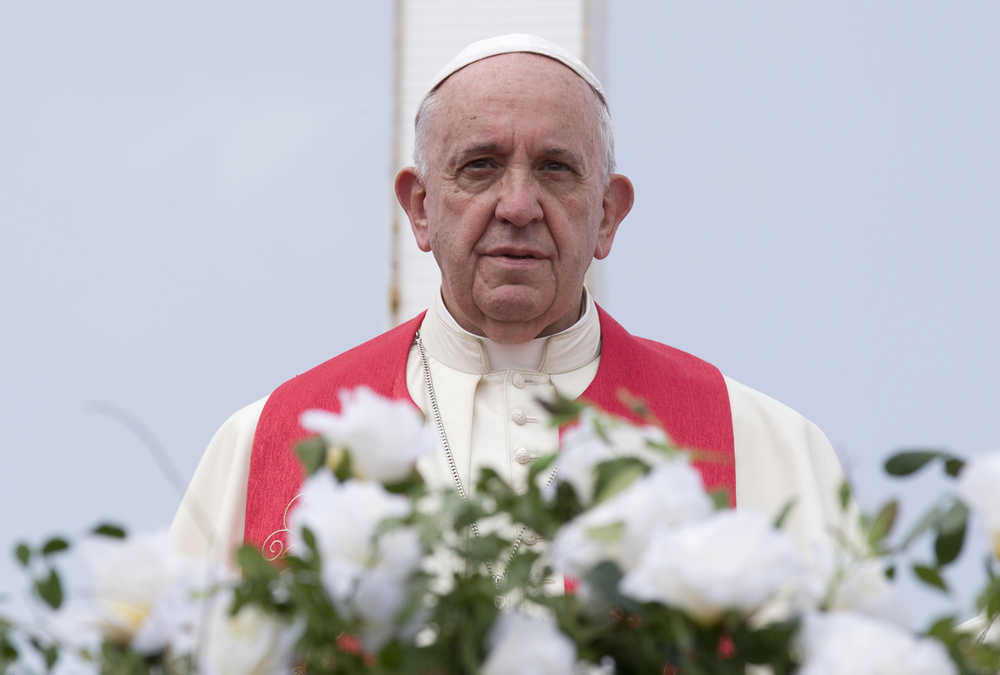SANTIAGO, Cuba — Pope Francis marked the anniversary Monday of the day he decided as a teenager to become a priest by pressing a subtle message to Cubans at a delicate point in their own history: Overcome ideological preconceptions and be willing to change.
Francis traveled to Cuba’s fourth-largest city, Holguin, and celebrated a Mass where Cuban rhythms mixed with church hymns under a scorching tropical sun.
Later in the day, he flew to Santiago for an evening visit to the shrine of Cuba’s patron saint, and today he will arrive in Washington for the U.S. leg of his visit to the two former Cold War enemies.
Singing children and a small crowd waving Cuban and Vatican flags greeted Francis on his arrival, some crying out, “Francis! Holguin is with you!” Holguin’s Plaza of the Revolution was packed with an estimated 150,000 people for the Mass, many dressed in white to protect them from the sun.
Security agents didn’t appear to be letting members of the crowd get close to him. On Sunday, an apparent dissident hung on to the popemobile in Havana and seemed to be appealing to the pontiff before the man was dragged away.
In his homily in Holguin, a city of about 300,000, Francis pressed some of the subtle themes he has developed during this balancing act of a Cuban visit. He told the crowd of how Jesus picked a lowly and despised tax collector, Matthew, and instructed him without casting judgment to follow him. That act of mercy changed Matthew forever.
Francis told the Cubans that they, too, should allow themselves “to slowly overcome our preconceptions and our reluctance to think that others, much less ourselves, can change.”
“Do you believe it is possible that a tax collector can be a servant?” he asked on Day 3 of his visit to the island. “Do you believe it is possible that a traitor can become a friend?”
It was a theme Francis sketched out Sunday night in an off-the-cuff encounter with young people. He encouraged them to dream big about what their life could be like, and not be “boxed in” by ideologies or preconceptions about others.
“If you are different than me, why don’t we talk?” Francis asked the crowd. “Why do we always throw rocks at that which separates us?”
The message comes at a delicate moment of change on the island. Cuba and the U.S. re-established diplomatic relations this year in a move Francis helped broker, and the communist country is undertaking modest free-market reforms that have opened some sectors of the economy to private enterprise.
Detente with the United States has raised hopes on both sides of the Florida Straits that the millions of families divided by the 1959 Cuban revolution will be reunited.
As a result, Francis has emphasized themes of reconciliation and looking beyond prejudice and ideologies.
“Francis is looking for peace among peoples and countries,” said Yordani Monteagudo, a 24-year-old government worker who recorded Francis’ encounter with young people Sunday night and was still talking about it a day later. “In his message he called on young people to not be afraid to dream. This makes you want to live, and build up this country.”
Francis’ homily also reflected a very personal story of his own faith and willingness to embrace change.
On Sept. 21, 1953 — 62 years ago Monday — a 17-year-old Jorge Mario Bergoglio went to confession at his parish church in Buenos Aires. During the confession, he later wrote, he “realized God was waiting for me,” and knew he was going to become a priest.
Bergoglio wouldn’t enter the seminary for several more years, but Sept. 21 — the feast of St. Matthew — has remained a crucial reference point for the pope.
“This Gospel of St. Matthew, this experience of Jesus who looks him in the eye and calls him to conversion to follow him, is something that is absolutely fundamental to the spirituality and life of the pope,” said the Vatican spokesman, the Rev. Federico Lombardi. “It is something that is at the root of Bergoglio’s religious vocation.”
The head of the opposition group Ladies in White said 22 of 24 members who wanted to attend Francis’ Mass in Havana on Sunday were prevented from going by Cuban security agents. And two well-known Cuban dissidents said agents detained them after the Vatican invited them to the pope’s vespers service at Havana’s cathedral.
Lombardi confirmed that some dissidents were invited to events to receive a greeting from the pope, but he said he didn’t know why it didn’t come to pass.
Asked if the Holy See would lodge an official protest, Lombardi demurred. He stressed that what was planned was just a “passing greeting,” not an official meeting, and that it was set up at the last minute out of a “desire to show an attention for everyone, including dissidents.”
___
Associated Press writers E. Eduardo Castillo, Michael Weissenstein and Anne-Marie Garcia in Havana and Christine Armario in Holguin, Cuba, contributed to this report.
___
Nicole Winfield on Twitter: https://twitter.com/nwinfield
Michael Weissenstein on Twitter: https://twitter.com/mweissenstein
___
This story has been corrected to show that Holguin is Cuba’s fourth-largest city, not its third-largest.

